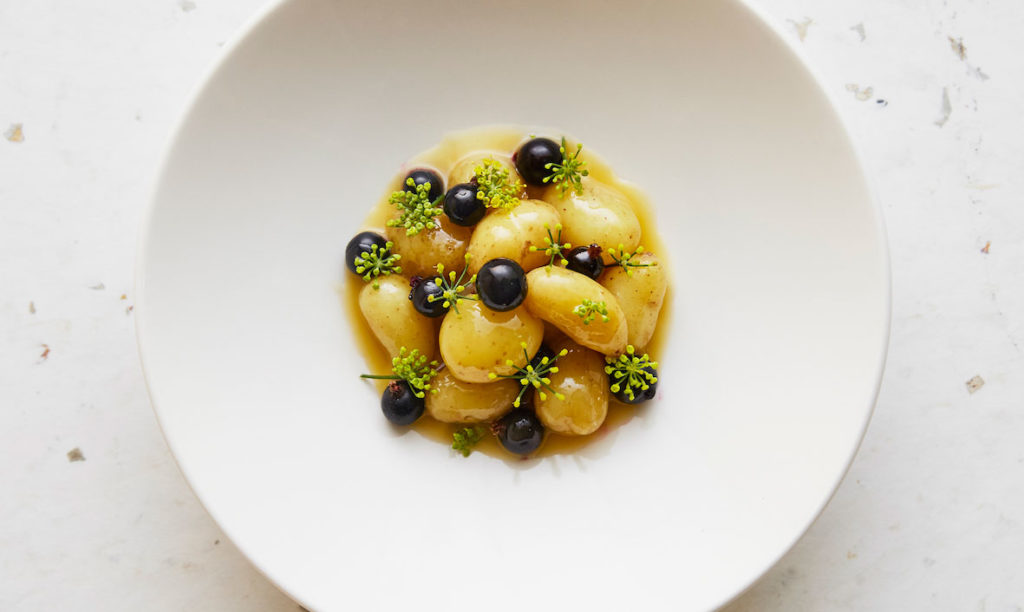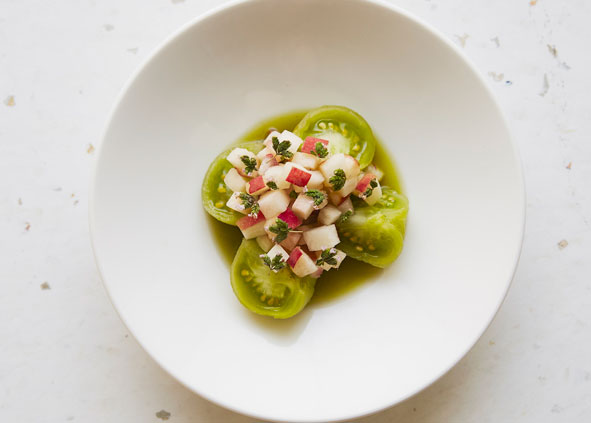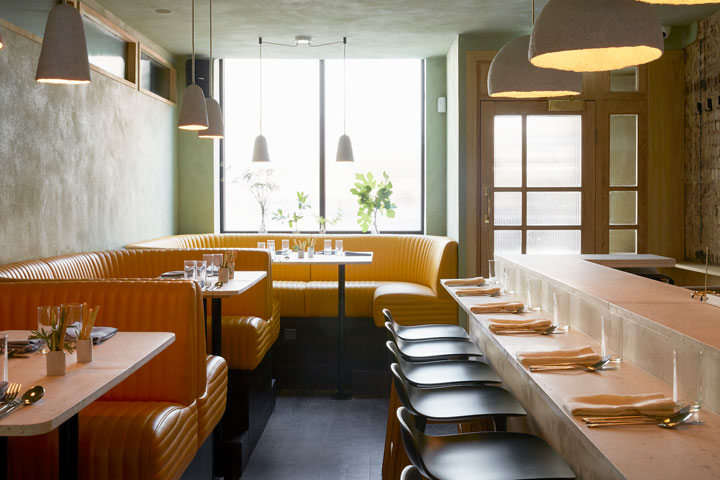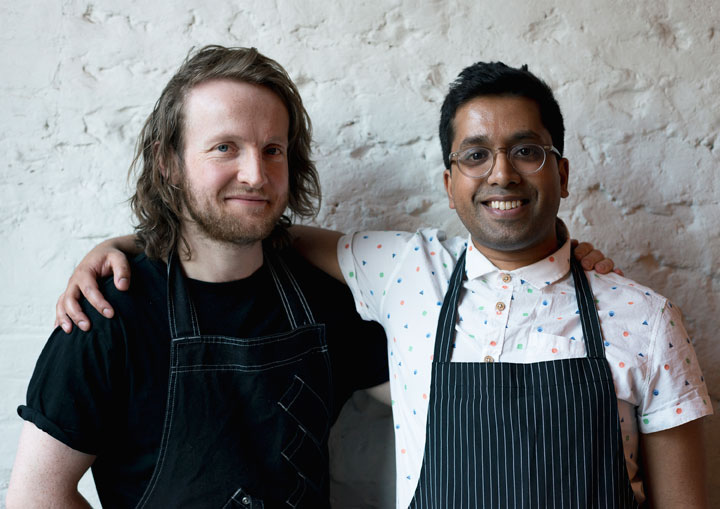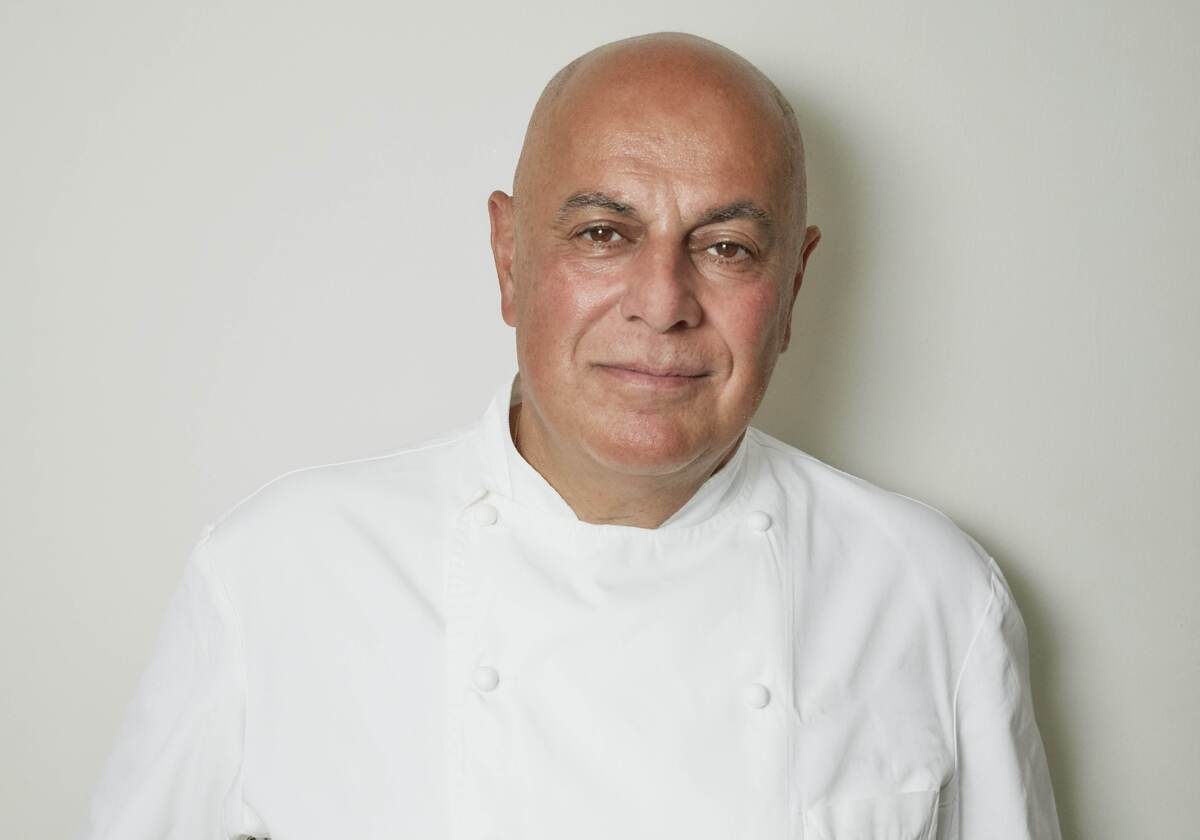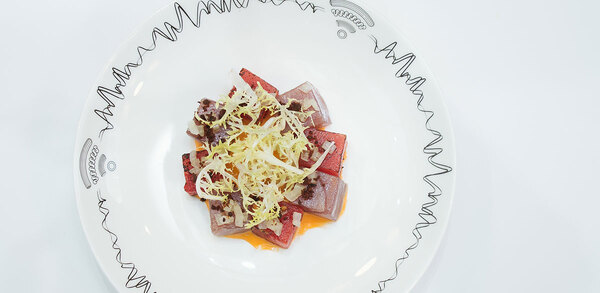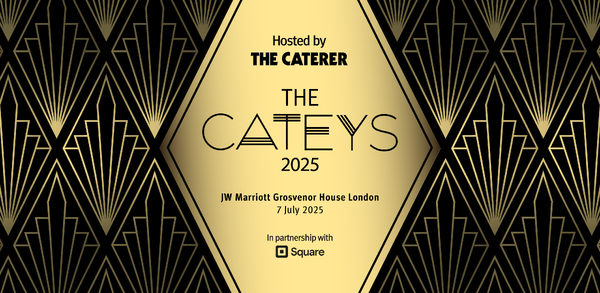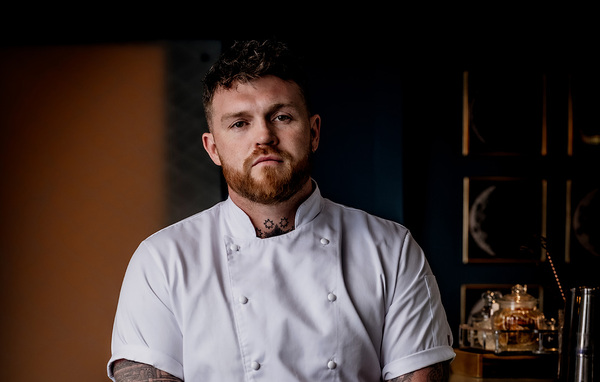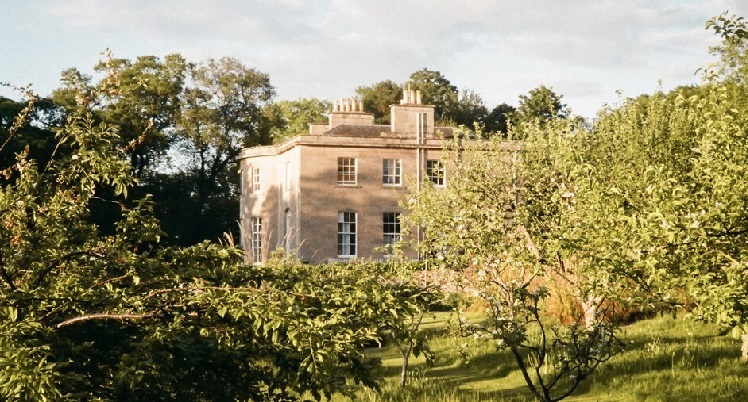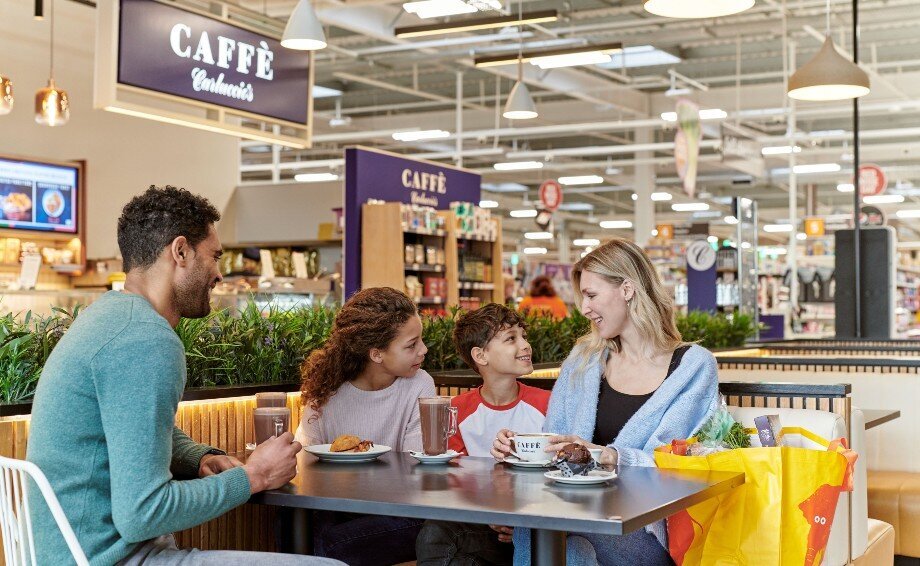Restaurant profile: sustainable London restaurant Cub, by Ryan Chetiyawardana and Doug McMaster
Award-winning bartender Ryan Chetiyawardana and chef Doug McMaster of Brighton's Silo have unleashed their inner geeks for Cub, a sustainable London restaurant that challenges preconceptions. Katie Pathiaki finds out how they plan to put product and materials in the spotlight
You closed your first venture, White Lyan, in April this year to open Cub. What inspired you to open a restaurant?
Ryan Chetiyawardana (RC):
How will you be doing that?
Doug McMaster (DM): We have a particular way of looking at a product, which I can only describe as zooming in and looking closer at the finer details. A good example is our broccoli dish. I love peasant food and ingredients that are not taken seriously enough or given the respect they deserve. Broccoli is wartime veg that is just thrown on the plate â" itâs not a beautiful thing and thatâs exciting to me.
RC: Thereâs a lot of geekiness behind it, but itâs done in a manner that is accessible. People arenât scared by broccoli and that allows us to look at the bigger conversation and include them. We want to push boundaries, but not to alienate people.
Will the menu be vegetable-led?
DM: It will be largely plant-based. For too long, protein has been centre stage. We are not the first to start banging that drum, but I think thereâs still a lot to be done.
RC: Itâs about getting people to look at familiar things in a different way and expanding their understanding.
How would you describe the style of food?
RC: Thereâs a contemporary aspect to all of this, so I think that in a modern sense, itâs not a particular style. We have both drawn from our experiences and we have kept ourselves open to draw influences from lots of different places. We always talk about clarity of flavour and how bright everything is â" itâs not heavy, muggy or muddy.
DM: We are confident enough to not mask flavours with garlic, rosemary and thyme.
RC: Itâs not about pairing; itâs about the whole experience. People will have a bit of their drink left when they start their meal and there will be a synergy between them, but itâs not about pairing per se. The way I approach drinks is atypical. We have a growing rig, so we will be growing some of the ingredients and changing the flavour of things during the growing process. I am a biologist by trade, so some of it is from my background, but we have also had specialists in. Arielle Johnson, former resident scientist at Noma and flavour scientist and directorâs fellow at the MIT Media Lab, is helping us by looking at the biomechanics behind the flavour of plants.
What inspires you both when you are thinking of new dishes and drinks?
DM: I like to think of it as a reaction to a potentially negative situation. At Silo we made a dish called the Summer Parsnip. There was anabundance of parsnips on a particular farm, but it was the summer so no one wanted them. So I created a dish where the parsnip was cooked in different ways. Itâs about research.
RC: We have a lot of shared outlooks on things, but a different vein of creativity. Sometimes Iâll come across a flavour that will trigger nostalgia and thatâs fun to play on. Other times, thereâs a concept or story you can start to weave in;Â sometimes itâs purely flavour led and other times itâs the story you can tell behind the food or drink. The benefit of that is we always have opportunities to explore.
Silo has a zero-waste policy â" will this carry over to Cub?
RC: Silo is all about zero waste and nothing is going to be better than Silo for that, so what we want to do is look at another conversation. Some of it is simple, like bringing value back to food and drink, but in a mass sense, we have sold out our food system, and we want to showcase how interconnected it is; that itâs not something that is throwaway and cheap.
DM: I think careful choice is one of the most under-rated parts of sustainability. If youâre churning butter to avoid the butter wrapper, but youâre churning it only for 10 people, then it doesnât make any sense. If you do it for 100 people, you can do it in the same amount of time. Fish is the best example. You could have a zero-waste restaurant but choose to serve cod â" is that sustainable? No, not at all.
Choosing rock salmon that has been line-caught is 10 times more sustainable.
Will the restaurant design reflect the food?
RC: The materials used are important, and reuse is a powerful tool. The kitchen
pass and the tables are made from recycled yogurt pots. All the paints are eco paints. The plaster is made from recycled plaster, which absorbs toxins in the air
and so improves air quality. All of the design has been thought of in a conscientious way. We have even elevated the booths to help people see what Doug is cooking. Itâs beautiful, comfortable and bright.
RC: I was actually training to be a chef while I was studying.
DM: I didnât know that!
RC: I went from school to the kitchen and then while I was studying, I worked in bars. I worked full-time and studied full-time. It was in my masterâs year that I won UK Bartender of the year for the first time. Doug, did you always want to be a chef?
DM: No and I didnât even want to do it when I was a chef! I am rubbish at reading, Iâm dyslexic and also terrible at maths. I didnât do very well at school and was never declared as anything apart from rubbish. So I dropped out of school and had a chip on my shoulder because I couldnât find anything
I enjoyed. I joined a kitchen as a potwasher at 16 years old and I really liked the environment â" it was expressive. Although there was discipline, you were able
to say what you wanted to say, and at that age I needed to blow off some steam. I worked every hour and thought: âIf Iâm going to work this hard for this little money, then I need to do it in the best restaurant.â I didnât love food at all â" I didnât even know how to fry an egg. I then moved to London and worked at [Fergus Hendersonâs restaurant] St John, which was the game-changer. St John isnât looked upon as an ecological restaurant or one trying to change the world, but it is a wonderful example of no bullshit, which goes a long way in our industry. The chefs there are not there to draw a lot of attention or impress anyone, but they think it makes sense to use the whole animal. It provoked me to think outside the box.
Do you hope to gain awards or accolades?
RC: We think itâs a really important message and accolades bring attention. Itâs not about aiming for certain awards, but it will help to spread the word and start discussions.
Doug McMaster was the head chef and is now development chef at zero-waste restaurant Silo in Brighton. He creates dishes using every part of an ingredient, and aims to reduce food miles and waste while preserving nutrients.
Silo was an idea born by McMaster and fifth-generation grower Joost Bakker. It started life in Melbourne, Australia, and McMaster ran it for a year before moving back to theUK. He opened it in Brighton in 2014.
The chefs at Silo make everything from scratch, including yogurt, vinegars and chocolate, from bean to bar. They grow their own vegetables and mill their own flour.
It has the smallest closed-loop recycling machine in the UK, which cost £22,000
and can make 60kg of compost overnight. Since moving to London to open Cub, McMaster has taken a development chef role at Silo three days a week. âItâs my baby and Iâm so fanatical about every single detail, but Silo is in very safe hands,â he says.
Ryan Chetiyawardana
Ryan Chetiyawardana cut his teeth at Bramble in Edinburgh and has since won the Diageo Reserve World Class UK Bartender of the Year competition in 2009, Havana Club Grand Prixâs UK Bartender of the Year competition in 2012 and been named in the Top 1,000 Influential Londoners in the Evening Standard in 2014, 2015 and 2016.
He opened White Lyan in 2013. It was the first cocktail bar globally to use no perishables, including fruit and ice, in order to reduce the amount of waste produced.
It was closed in April 2017 to make wayfor Cub, with the Super Lyan bar opening inthe basement.
Chetiyawardana also owns the Dandelyanbar at the Mondrian London at SeaContainers. It was named best place todrink in Britain by The Observer in 2015.
Alongside the bars, he also has a range of cocktails on offer at Selfridges and in 2015 is first book was published: Good Things to Drink with Mr Lyan and Friends.



